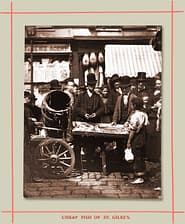
IT has often been remarked that but for our cheap fish supply the poor of London would undoubtedly be reduced to the most acute stages of starvation. Notwithstanding, therefore, the obnoxious smell and dirt created by a street fish-stall, this method of selling fish, if it insures cheapness, and brings the fish to the doors of the poor, is undoubtedly useful. The costermonger is certainly in a position to supply fish at a low price. He need not rent a shop, or consume expensive gas, or pay enormous rates; the chief anxiety of his life is to procure a barrow, and that is a trivial matter,when compared to the responsibilities of the ordinary tradesman and fishmonger. Then there are barrow clubs that dispel even this difficulty. They are constituted after the model of building societies. Members pay sixpence per week, and when sufficient money has been accumulated to buy a barrow, lots are drawn, and the barrow given to the winner, who must henceforth pay a shilling a week till the cost has been refunded. Awaiting the moment when the costermonger is able to procure a barrow of his own he must pay eighteen pence per week for the cost of hiring. Then he must beware of the police, who have a knack of confiscating these barrows, on the pretext that they obstruct the thoroughfare and of placing them in what is termed the Green Yard, where no less than a shilling per day is charged for the room the barrow is supposed to occupy. At the same time, its owner will probably be fined from half-a-crown to ten shillings, so that altogether it is much safer to secure a good place 1n a crowded street market. In this respect, Joseph Carney, the costermonger, whose portrait is before the reader, has been most fortunate. He stands regularly in the street market that stretches between Seven Dials and what is called Five Dials, making his pitch by a well-known newsagent’s, whose shop serves as a landmark. Like the majority of his class, he does not always sell fish, but only when the wind is propitious and it can be bought cheaply. On the day when the photograph was taken, he had succeeded in buying a barrel of five hundred fresh herrings for twenty five shillings. Out of these he selected about two hundred of the largest fish, which he sold at a penny each, while he disposed of the smaller herrings at a halfpenny. Trade was brisk at that moment, though the fish is sometimes much cheaper. Indeed, I have seen fresh herrings sold at five a penny; and this is all the more fortunate, as notwithstanding the small cost, they are, with the exception of good salmon, about the most nutritious fish in the market. Herrings contain far more fat than either soles or whiting, and are therefore much more useful. Cod would be as good if we were able to eat the liver; but, in default of this, eels and herrings give the most strength and nutriment.
When there is a great demand for fish, or an exceptional bargain can be offered, it is possible to sell a whole barrel of five hundred herrings in two hours and a half, but at other times it may take more than a day to get rid of the same quantity. These fluctuations in the sale often compel the costermongers to avail themselves of the help proffered by persons hanging about the market. Thus, on Carney’s left hand may be noticed a German ” pal,” who has volunteered to help him to clean and scrape the fish, though his real calling in life is that of rolling cigars! It is questionable whether the detritus of herrings is calculated to add to the agreeable flavour of the fragrant weed which this youth would be subsequently called upon to manipulate, but the frequenters of Seven Dials are not very particular over such trifles. On the other side of the herring-barrel, and with his back to the lamp-post, is a poor orphan boy, generally known by the frank if uncomplimentary cognomen of “Ugly.” He is the adopted child of the market. He has no relations, no friends, but the whole market supports him. He spends his time wandering about from barrow to barrow, from stall to stall, eagerly watching for an opportunity of rendering himself useful, so as better to merit the pence which, in their sympathy for his forlorn condition, the costermongers never fail to give him. The unostentatious manner in which this was related to me by one of the costermongers was very characteristic of the freedom with which the poor help each other. In the foreground, a boy with a pitcher was about to fetch some spring water, to bathe a woman’s sprained ankle, an impression prevailing that spring water would produce a more rapid cure than the ordinary water supplied to the houses of the district; while, in the background, the sole personage who can boast of so respectable an appendage as a silk hat, stands the proud owner of two houses situated within the immediate vicinity, and who, consequently, disapproves of street markets. They have a tendency to reduce the value of house property.
” Little Mic-Mac Gosling,” as the boy with the pitcher is familiarly called by all in his extended circle of friends and acquaintances, is seventeen years old, though he only reaches the height of three feet ten inches. He is, in fact, so small, and, at the same time, so intelligent for his size, that he once held an excellent situation as a lady’s page; but I presume he is now getting too old for such an office. His bare feet, I should add, are not necessarily symptoms of poverty; for, as a sailor, and during a long voyage to South Africa, he learnt to dispense with boots and shoes while on deck. The best customers for the fish sold in the streets are, according to Joseph Carney’s experience, the Jews, for they not only buy the greatest quantity of fish, but give the highest price- a peculiarity not often attributed to the children of Israel. The fish sold in the neighbourhood of the Dials is, I am assured, especially renowned, and the Jews who frequent this market are far more wealthy and liberal than their co-religionists of the East End. On the other hand, they Will not buy skate, eels, or shell-fish; but they are particularly partial to haddocks, which they fry with eggs in salad oil, and eat with slices of lemon. The Irish will not give half the money the Jews freely pay for fish, so that, perhaps, the French are the next best customers. They come in large numbers from Soho, and being such good cooks, can utilize fish in a number of dishes totally ignored by the English poor. Strange to say, Lent is a bad time for this business; the winds are often unfavourable during this period of the year, and the fishing-smacks are unable to come up the Thames. The costers have often to wait at Billingsgate market from seven in the morning till late in the afternoon before they can get any cheap fish. This loss of time is disastrous, particularly as it makes them miss the dinner-hour, when some of their stock might have been sold. When the fish has been finally bought, the market porters convey the barrels, hampers, or casks of fish to the coster’s barrow, for which they receive fourpence per parcel, the coster preferring to reserve his strength to drag his stock to his customers. Should he suspect that the fish is not good, he must, to obtain reimbursement, take it to the authorities, at what is termed the stone-yard. H ere the case or hamper is opened before the inspector and other witnesses, and if the fish are not good they are taken away and mixed with lime. This practice opens out the broad question of the utilization of this refuse. It should be converted into an innocuous though fertilizing manure; but the problem is altogether beyond the scope of this chapter.
As a rule, most money is realized on the sale of fish from November to January, and in that season sometimes as much as £1 net profit may be gained in a day. This is, of course, quite exceptional, and such irregularities render it especially difficult to estimate a costermonger’s income. The average varies, I am assured by some of the class, from 30s. to £2 per week, so that the costermongers can, if they choose, live in a comfortable and respectable manner. They are certainly honest and trust- worthy, and pay their debts. We must also credit them with considerable industry and perseverance. At seven o’clock they must reach Billingsgate, yet they may be found selling their fish as late as ten in the evening on ordinary days, and they are still at work at midnight on Saturdays. But, unlike the Italian ice-men, they have no care for their old age; nor have they any dread of accidents or sickness. They look to the hospitals to cure their physical ailments, and as for old age, they deny that it will prevent them working. They may not earn so much when the energy of youth is spent, but they will always be strong enough to sit on a stone or a stool by a barrow or tray containing a few fish to be sold. They, therefore, repudiate the necessity of saving more money than what is required for the purchase of a barrow and some stock; and in this they show that singular lack of ambition which is peculiar to some sections of the English poor.
A. S.
